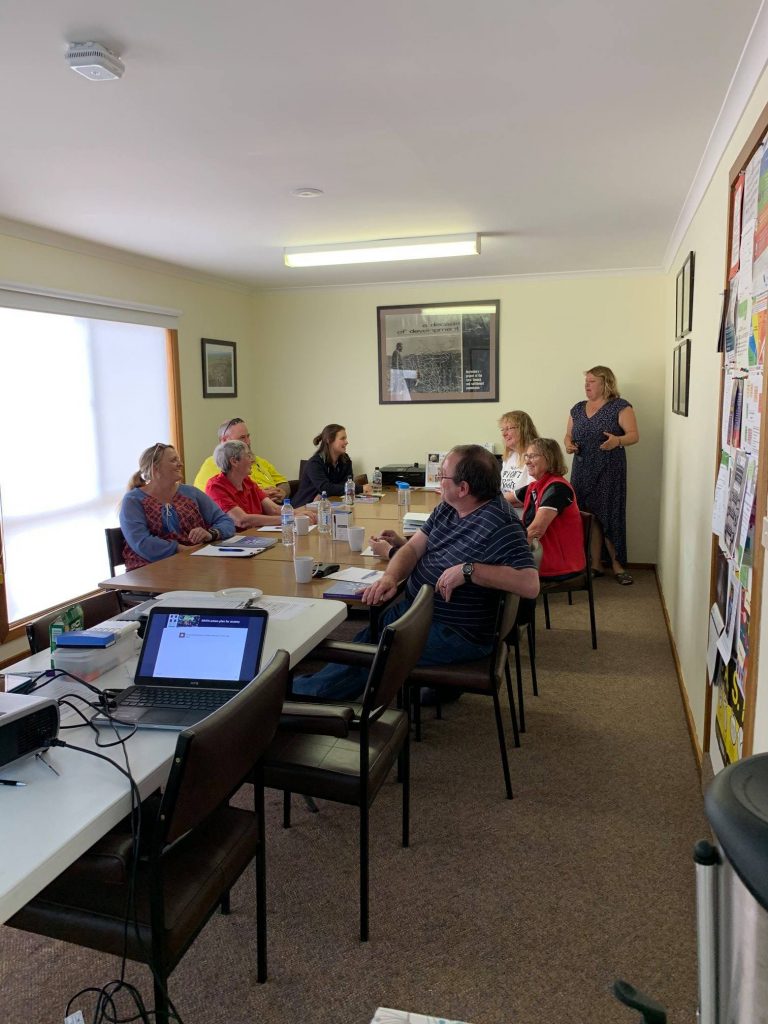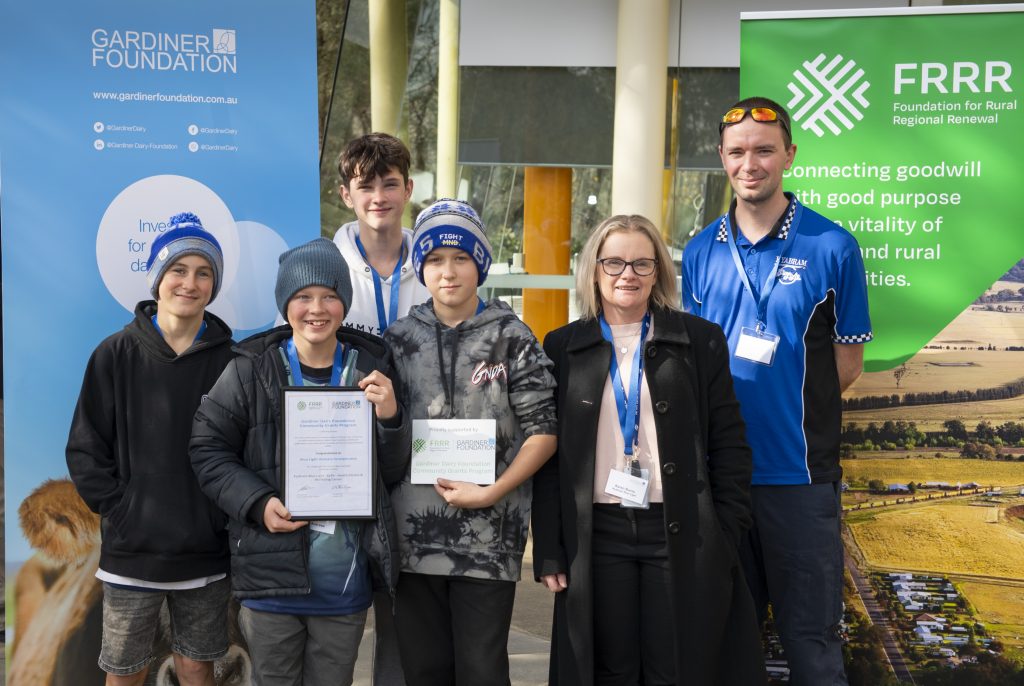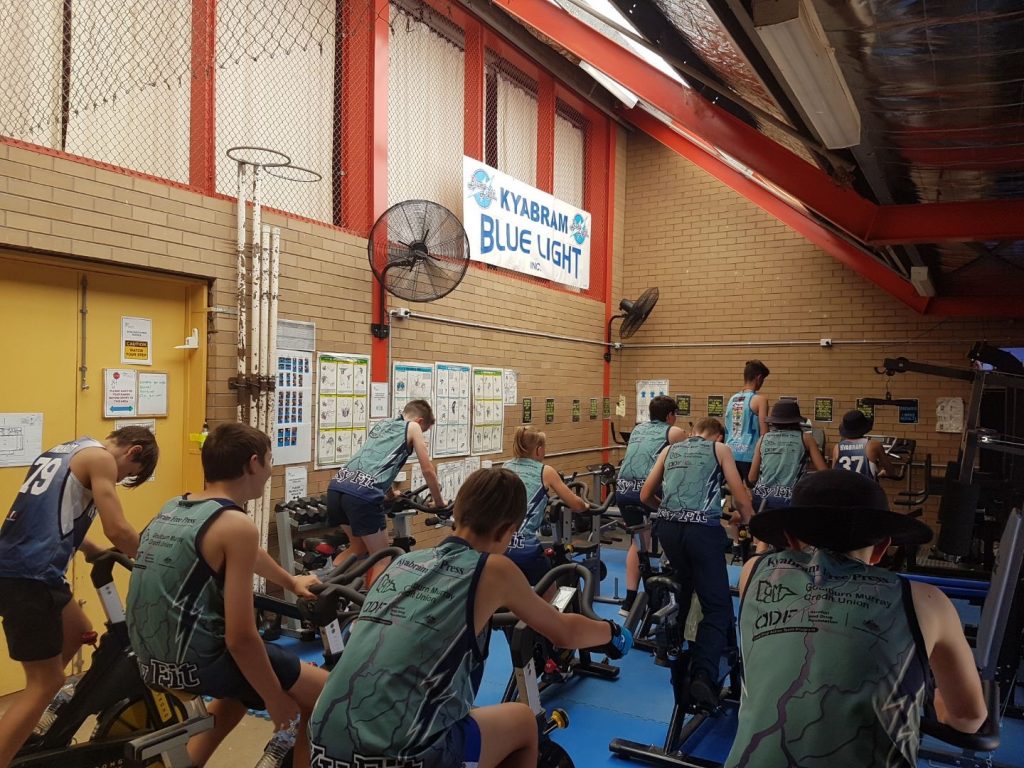Foundation for Rural & Regional Renewal (FRRR)
More than $120,000 awarded to local not-for-profits
FRRR and Gardiner Foundation have awarded $124,478 to 27 community groups across Gippsland, South Western and Northern Victoria for local initiatives that will support, strengthen and sustain their dairying regions.
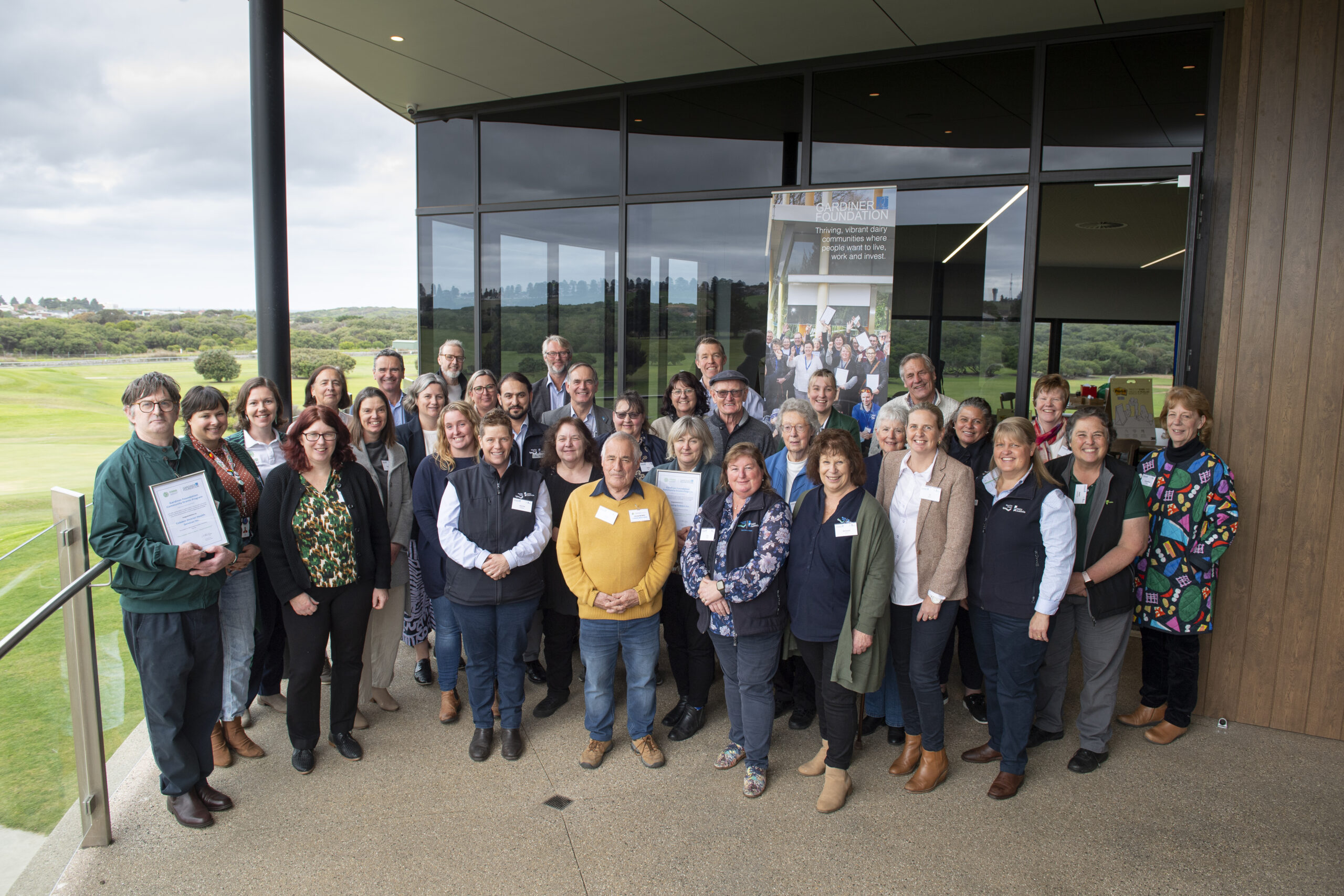
For 22 years, the Gardiner Foundation Community Grants program has empowered not-for-profit organisations in Victoria’s dairy communities to create and lead projects that help locals to connect and support their farming regions to be sustainable and vibrant places to live and work.
This year, Victoria’s dairying regions will be boosted by a wide range of community-led projects including:
Allan Cameron, Gardiner Foundation CEO, said that the organisation’s longstanding partnership with FRRR has enabled it to invest more than $2.4 million in Victoria’s dairying regions.
“The Community Grants Program aims to support purpose-driven, not-for-profit organisations in rural and regional Victoria by enhancing their capacity to serve their local communities effectively.
“Since the program began in 2003, we have supported over 600 projects across the state. These grants provide crucial financial support to community groups, helping them overcome challenges as they work to revitalise their communities.
“We take pride in recognising the remarkable efforts of these groups within their communities, often carried out voluntarily, and in assisting them by funding projects that they believe will significantly enhance community resilience,” Mr Cameron said.
Jill Karena, FRRR Place Portfolio Lead, said that the impact that the Gardiner Foundation Community Grants program has had over the past 22 years is a testament to what is possible through collaboration with partners like Gardiner Foundation.
“Not-for-profits work tirelessly to strengthen and grow the social and cultural fabric of their communities. But with the current economic landscape and climate-related transitions impacting Victoria, keeping these organisations up and running is becoming exceedingly difficult. Therefore, it’s not surprising that this year we saw a predominant need from community groups for funding to develop organisational resilience and capacity.
“Victoria’s dairy regions are resilient and resourceful, and we have seen, firsthand, the transformational change and outcomes that local people can achieve when they have access to funding.
“We are proud to play a small role in enabling these groups to drive change, build connections and share the vibrancy and determination of those living in Victoria’s dairying regions,” Ms Karena said.
The full list of grant recipients and their projects are below.
| Organisation | Project | Location | Grant | |||
|---|---|---|---|---|---|---|
GIPPSLAND | ||||||
| A Better Life for Foster Kids Inc | Crisis Cases for Emergency Foster Care Improving community health and social wellbeing via the provision of Crisis Cases to support the transition of children into foster home emergency care in the Sale area. | Sale | $4,960 | |||
| Baw Baw Shire Council | Tables and Chairs for the Social Club Room Build community resilience through improvements to a meeting place that is used by local groups to improve social connectedness in Ellinbank and the surrounding region. | Ellinbank | $4,800 | |||
| Bruthen and District Citizens Association Inc | Community Grow Swap Learn Program & Workshops Build community resilience through purchasing equipment and running workshops that increase capability and capacity for local community gardening and increase participation and learning to improve community health and wellbeing. | Bruthen | $5,000 | |||
| Fabelo Inc on behalf of Fishy Stories | Fishy Stories Improving community health and social wellbeing by contributing to young children's learning activities at a local festival. | Fish Creek | $5,000 | |||
| Fish Creek Football Netball Club Inc | Recipes for Recovery Cookbook Build community resilience by recording the stories of the families within our community through food, producing a functional recipe book that will be treasured by generations to come and support local fundraising. | Fish Creek | $5,000 | |||
| Friends of Coal Creek Inc | Digitisation of the Historical Assets of Coal Creek Build organisational capacity to preserve historical items through digitisation, which will support tourism and enhance local identity and pride. | Korumburra | $5,000 | |||
| Heyfield War Memorial Hall Committee of Management Inc | Upgrade Kitchen Cupboards Improve community infrastructure with new kitchen drawers to increase utility for senior and disabled community members at the Heyfield War Memorial Hall. | Heyfield | $3,300 | |||
| Hillview Bunyip Aged Care Inc | Community Kitchen Project Build community resilience through installing a kitchen to provide a facility for local catering and programs to address food insecurity in Bunyip and surrounding communities. | Bunyip | $5,000 | |||
| Labertouche and District Men's Shed | Upgrade Wood-splitter to Electric Start Motor Build organisational capacity by installing an electric start motor on the wood-splitter that enables the local Men's Shed to contribute services of land clearing, firewood collection and woodworking to the Labertouche community. | Labertouche | $3,578 | |||
| Treble F Singers Inc | Training and Administration Aids Build organisational capability through purchasing audiovisual equipment and a laptop to improve operations and administration for the local choir, supporting local opportunities for participation and performances to support community activity. | Leongatha | $2,907 | |||
| Venus Bay Tarwin Lower and District Men's Shed Inc | Festival FREE Fun for Kids Build community resilience and a stronger economy through providing free activities for children and entertainment for locals and tourists to support attendance of the 2024 Tarwin District Community Show. | Tarwin | $5,000 | |||
| NORTHERN VICTORIA | ||||||
| Gargarro Botanic Garden Ltd on behalf of Friends of Gargarro & Nursery | Growing More Than Plants Build community resilience through extending a community-run nursery to support volunteers, grow plants for the local botanic garden, and support the community organisation's financial sustainability. | Girgarre | $5,000 | |||
| Greta Valley Landcare Group | Moyhu Walking Track Landscaping Project Enhance community infrastructure by establishing a safe and educational pathway for accessing the King River from Moyhu to support both residents and visitor enjoyment of, and connection to, the local environment. | Moyhu | $5,000 | |||
| Gundowring Recreation and Hall Reserve Committee of Management | The Gundowring Hall in the 21st Century: Warm in Winter, Cool in Summer Improve community infrastructure with a split system air conditioner installed at Gundowring Hall to support increased community meetings, craft and wellbeing activities. | Gundowring | $4,752 | |||
| Lions Club of Upper Kiewa Valley Inc on behalf of Kiewa Valley Community Garden | Sprout & Stow - Kiewa Valley's Garden Gear Garage Enhance community facilities with a lock up container installed to store and maintain gardening equipment for all the users and visitors to the Kiewa Valley Community Garden. | Tangambalanga | $5,000 | |||
| Lockington District Business Centre Inc | Locky Ukers Project Build community resilience and cultural vibrancy in Lockington with musical gear to support the Locky Ukers in their community ukele practice and performance, ensuring inclusive participation and improvement. | Lockington | $2,129 | |||
| Murrabit Advancement Association Inc | Murrabit - Keeping Up With the News! Improve capability of organisation by purchasing a new photocopier to support local information distribution, including a monthly community newsletter that enables connection, enhances the services volunteers provide to community, and promotes local activity for greater participation and economic strength. | Murrabit | $5,000 | |||
| NCN Health | Chills Skills Across the Community - Supporting the Mental Wellbeing of Children in Moira Shire Build the resilience of primary school children through implementing a mental health program with local facilitators trained in an evidence-based program and supported to develop an ongoing community of practice. | Cobram | $5,000 | |||
| North East Regional Pre-School Association Inc on behalf of Whorouly and District Preschool | A Water Garden for Whorouly Kindergarten Increase the capacity for learning through play with the installation of a water play area with shade sail at Whorouly Kindergarten, supporting educational and social development of current and future preschoolers and children attending playgroup. | Whorouly | $5,000 | |||
| SOUTH WESTERN VICTORIA | ||||||
| A is for Atlas Limited | Dining Room Tales X Keayang Maar 2024 Build community resilience through delivering unique international artist experiences to enable rural communities access to global learning experiences for social resilience, and enable tourism opportunity. | Dixie | $4,419 | |||
| Anam Cara House Colac Inc | Renewable Rays for Respite - Sustainable End-of-Life Care Through Solar Energy Improve organisational infrastructure with a solar panel system that will reduce operational costs and allow for savings to increase care services. | Colac | $4,537 | |||
| Beech Forest & District Progress Association Inc | Strengthening Community Through Rebuild of the Old Beech Forest Bakery Oven Build community resilience and foster connection through installing seating and steel benches to complement the re-build of old Beech Forest bakery oven to benefit the community with staple food access and increasing economic and educational opportunities to build a more inclusive, sustainable future. | Beech Forest | $4,975 | |||
| Cobden District Health Services Inc on behalf of Cobden Men's Shed | The Cobden Men’s Shed – Shed Extension Build community resilience with an extension to expand Cobden's Men's Shed facility and increase the capacity for participation and activity that supports mental health and social wellbeing. | Cobden | $5,000 | |||
| Coragulac & District Kindergarten Inc | Skylights and Ventilation Increase the capacity for learning through installation of skylights and ventilation at Coragulac & District Kindergarten, supporting educational and social development of current and future pre-schoolers. | Coragulac | $5,000 | |||
| Progressing Cobden Inc on behalf of Cobden & District Historical Society | Equipment to Enable Cataloguing, Labelling and Storage of Collected History Build community organisational capacity by upgrading the equipment of the local historical society to enable digital cataloguing and conservation that will preserve local identity and support research on local and family history. | Cobden | $4,121 | |||
| Terang & District Progress Association | Activities at Colour Terang Festival 2024 Foster community vibrancy and social connection via free activities for children at the Terang Colour Festival, to enable affordable participation for the whole community. | Terang | $5,000 | |||
| United Way Glenelg Victoria Incorporated | Imagination Bush Library Increase the capacity for learning and social development by providing children with books to build their literacy skills and love of reading. | Dartmoor | $5,000 | |||
The Kyabram Development Committee consists of an enthusiastic group of locals who recognised the need to inject some excitement, connection and economic support into their community. In the words of one of their committee members the goal was to ‘get Kyabram back on the map’, referencing the town’s off-the beaten track location between popular tourists’ routes. The Committee observed a large strain on the mental and financial wellbeing of their town’s residents, and were determined to do something about these challenges.
A $5,000 grant from FRRR’s Gardiner Foundation Community Grants program was pooled with the organiser, Kyabram Development Committee’s own fundraising, along with funding from the local Bendigo Bank, Ky Valley Dairies and other sources, to put on the Kyabram Tastes & Tunes street festival.
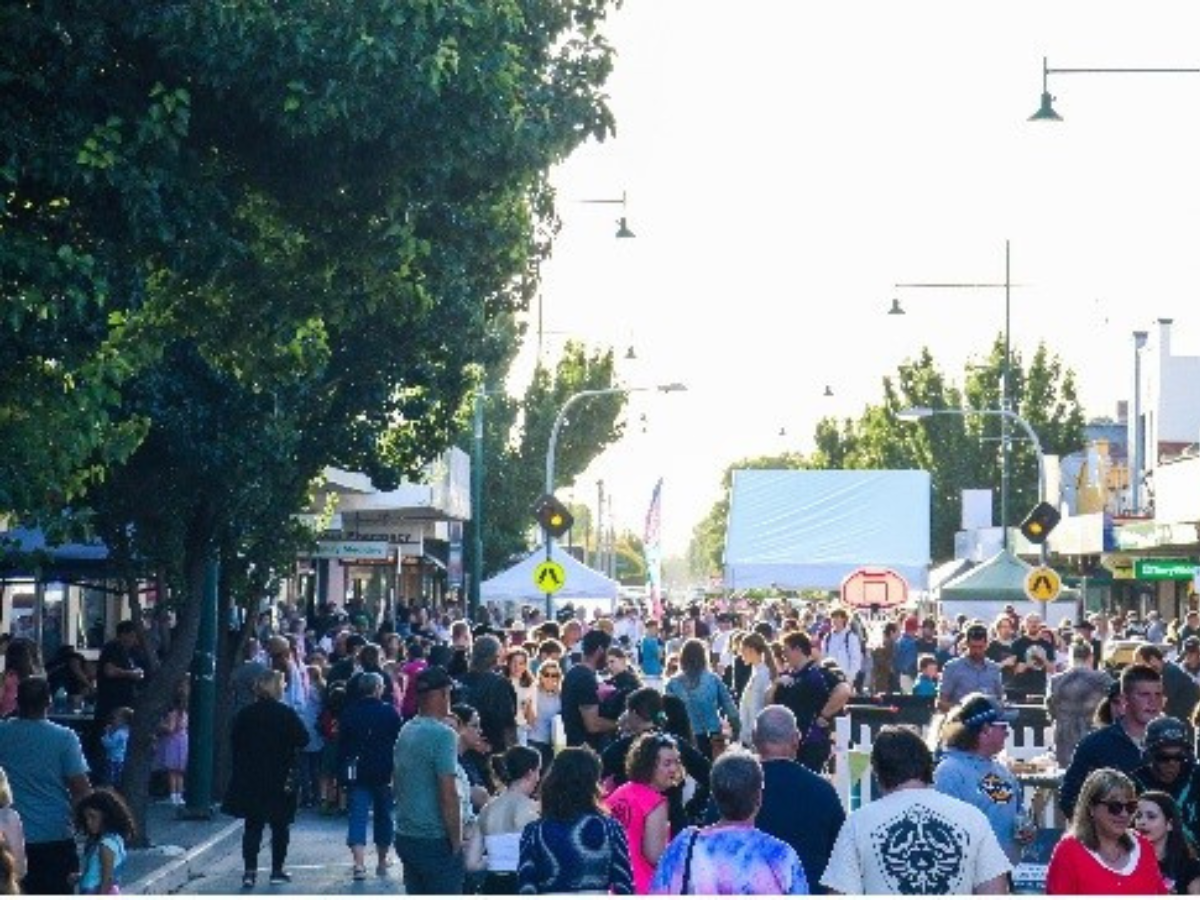
The Festival was successful in meeting its goal of fostering community connections. The Committee aimed to attract 1,000 people, but exceeded this with a bustling crowd estimated at around 4,000, demonstrating the event’s tremendous success. The Festival not only brought significant financial gains for local businesses, but also allowed Kyabram to highlight its strengths by featuring local products and produce. Positioned in the heart of one of Northern Victoria’s largest dairy and fruit orchard regions, the Festival provided numerous tasting opportunities. Additionally, it underscored why Kyabram is a fantastic place to live.
The FRRR grant funded Festival entertainment, which featured diverse offerings to attract all age groups. For children there were activities like face-painting, Youth Club games, fairy floss, and more. Adults enjoyed live music from both local performers and internationally recognised acts such as The Baker Boys. The town buzzed with people mingling and enjoying good company, delicious food and entertaining performances.
Committee member Tania reported that the night was amazing and it’s been suggested it’s the best family event ever held in Kyabram. This event went a long way towards the Committee’s aim of making it an annual, unmissable opportunity to visit the town.
The Kyabram Tastes and Tunes Festival certainly achieved many of FRRR’s Gardiner Foundation Community Grants program objectives. It effectively contributed to building community resilience, fostering cultural vibrancy, strengthening economic vigour, and importantly, improving community health and social wellbeing. On a final note, the Kyabram Development Committee thanked FRRR and the Gardiner Foundation for their donation, emphasising its vital role in the success of the event.
In the Victorian dairy region of Gippsland, a small primary school identified challenges with the gender imbalance at their school and came up with an idea they felt could address the matter and improve the learning outcomes of their students.
Welshpool and District Primary School applied for a Gardiner Foundation Community Grant in 2022. At that time, they had 32 enrolled students, seven of which were girls (22%) and 25 (78%) boys. Recognising the need to support the girls in their school and promote connection and empowerment, the community secured a $5,000 grant. This grant allowed the school to further invest in their science program, via the ‘IncrediGirls’ program, with a focus on the girls within their school.
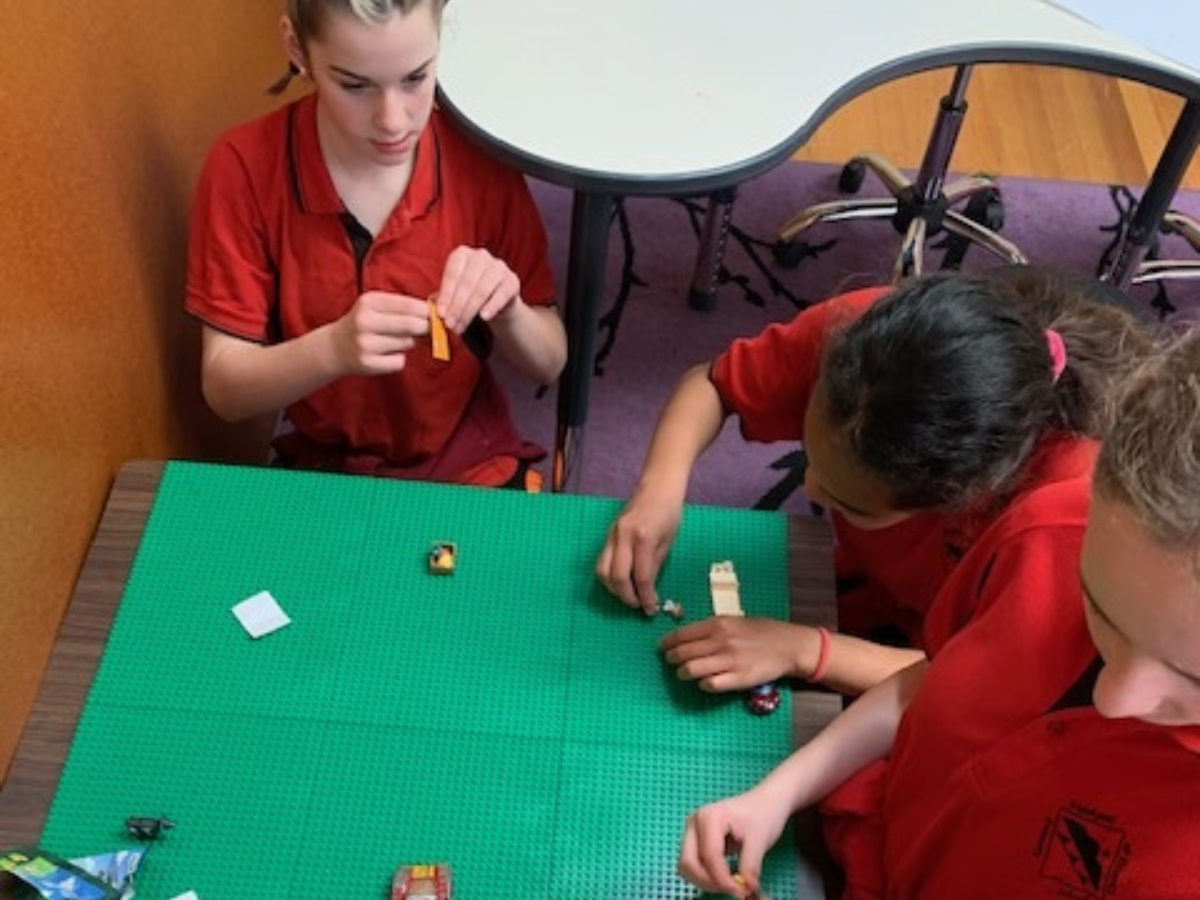
The ‘IncrediGirls’ program delivered science, technology, engineering and mathematics (STEM) activities to the girls in the school. The participants were then encouraged to share the same experiences with other students in their class, with the support from their teachers. The program also featured guest speakers from the community, fostering connections beyond the school. Activities encompassed a variety of events such as RUOK day, shop visits, STEM-focussed sessions, Kinder transition books, LEGO build days (as shown in the image), and more.
This project aligned with FRRR’s Gardiner Foundation Community Grants program objective of ‘Providing Lifelong Education and Training’ via projects that provide locals with access to opportunities that enrich their learning and skills development. The implementation of the ‘IncrediGirls’ program at Welshpool and District Primary School created opportunities for students to develop an interest and passion for STEM skills. Additionally, it indirectly fostered teamwork, connection and leadership opportunities.
Gabrielle Boyd, the principal of Welshpool and District Primary School expressed gratitude from the school and the students for the grant.
“This has been such a fantastic grant opportunity for our school. The students were very excited to know they had been selected to receive the grant and the ‘IncrediGirls’ loved being involved in the spending of the funds as well.”
She continued saying, “The program has contributed to improvements in self-esteem, teamwork, friendships, connections and has broadened students’ perspectives globally, shifting the focus beyond themselves. This has, in turn, enhanced community life in this small, outer regional community.
“Our school is very proud that the ‘IncrediGirls’ program is not only thriving within our school but, thanks to the positive outcomes, is also expanding to other schools in the region.”
Twenty-eight community-led projects will share $123,850 in grants, thanks to a partnership between FRRR and the Gardiner Dairy Foundation.

This is the 21st year of the Gardiner Dairy Foundation Community Grants, which provide up to $5,000 for locally-led projects that strengthen Victorian dairy communities.
Allan Cameron, Gardiner Foundation Chief Executive Officer said that local community groups and not-for-profit organisations play a critical role in the sustainability of Victoria’s dairy communities and it’s great to be able to support them to bring their ideas to fruition.
“Once again, we’ve seen creative projects come through from community groups to address persistent issues. Our commitment to the Victorian dairy industry values these groups and their ability to create vibrant communities broadly benefitting all residents including those involved in dairy. We look forward to hearing about the impacts as these projects are implemented in the coming year,” Mr Cameron said.
This year, the program attracted lots of interest, with community groups reporting challenges in local fundraising following two years of COVID interruptions and increasing operational costs hitting hard in the current economic environment.
Despite this, these local groups show a determination to overcome challenges and invest in projects and initiatives that enhance local opportunities or help fill gaps in service delivery, explains FRRR’s CEO, Natalie Egleton.
“In the applications this round, we saw a range of programs, activities and event equipment purchases that at their core build the social capital of the communities. From supporting a new community choir to several programs for engaging and enabling young people in learning, social and physical development. These and many other projects ensure that community facilities are fit for purpose to support meetings and activities, and that programs such as creating an edible garden present new opportunities for volunteers to develop skills and knowledge.
“This diversity of projects reflects that each of these communities is different and, therefore, so too are their needs and priorities. We are grateful to the Gardiner Foundation for recognising the importance of communities being able to access flexible funding to fill these gaps and for partnering with us for so long to provide this funding,” Ms Egleton said.
Among the projects funded are:
Gippsland
Northern Victoria
South Western Victoria
A full list of grant recipients is detailed below.
| Organisation | Project | Location | Grant | |||
|---|---|---|---|---|---|---|
GIPPSLAND | ||||||
| Hillend & Grove Rovers Football Netball Club | Interactive Display Screen Build digital capability by purchasing an interactive large screen for the sporting club's meeting facilities to support local training for CFA and community information nights. | Willow Grove | $4,272 | |||
| Jeetho Hall Inc | Planning Ahead to Maintain our Unique Community Asset Building community resilience by improving local community infrastructure and meeting places to increase hall usage for social connectedness and economic prosperity. | Jeetho | $5,000 | |||
| Manna Gum Community House Inc | Corner Inlet Young People's Cooperative Increase youth engagement and participation in social community activities with street games equipment and art supplies for Community Houses in the Corner Inlet region. | Foster | $4,982 | |||
| Milpara Community House Inc | What's a Good Thing To Do? Support young people's social connection in Korumburra by engaging them in a co-design process to imagine and develop local spaces and activities for their use. | Korumburra | $5,000 | |||
| Mirboo North Grainstore Committee of Management Incorporated | Improving the Usability of our Community Space Building community resilience by improving local community infrastructure and meeting places. | Mirboo North | $5,000 | |||
| Orbost Exhibition Centre on the Snowyriver Inc | pARTicipate — Part 3 Digital Connections to Strengthen Community Participation Build the capacity of the Orbost Exhibition Centre by purchasing a portable video conferencing system to improve community meeting options, including remote connection to increase participation in activities. | Orbost | $5,000 | |||
| The Leongatha Men's Shed | Heating and Cooling System for Communal Area Improve community facilities by purchasing an air conditioner for the local Men's Shed to support members and other community groups using the space. | Leongatha | $3,795 | |||
| Treble F Singers Incorporated | Community Singing Group — Enhancing the Health and Wellbeing of Its Members Enhance community vibrancy and culture through supporting the Treble F Choir's purchase of a filing cabinet for sheet music and a video camera to record performances. | Leongatha | $1,136 | |||
| Welshpool and District Primary School | Wetland Warriors Enhance educational outcomes through enabling hands-on, nature-based educational outcomes for students by purchasing tools for the Wetland Warriors program. | Welshpool | $5,000 | |||
| Yinnar & District Historical Society & Museum | Installation of Split System in the Old Railway Goods Shed Improve community facilities by purchasing an air conditioner to support volunteers and improve visitor experience at the Yinnar Museum. | Yinnar South | $4,100 | |||
| NORTHERN VICTORIA | ||||||
| Boys to the Bush Ltd | Wangaratta Men of Tomorrow Schools' Program Support Boys to the Bush to deliver a program of development for adolescent boys to engage positively with peers and their community through an extra-curricular program of practical learning. | Wangaratta | $5,000 | |||
| Corryong Historic Machinery Club Inc | Corryong Historic Machinery Club Museum Build community resilience through building capacity of the Corryong Historical Machinery Club with IT, defibrillator and air conditioning to support operations and development. | Corryong | $4,135 | |||
| Gannawarra Shire Council | Supporting Rural Mental Health & Wellbeing Post Floods Build community resilience through mental health and wellbeing workshops delivered across the Gannawarra Shire that was impacted by 2022 flooding. | Cohuna | $5,000 | |||
| Goulburn Region Preschool Association Inc | Tungamah Kinder Bike Path Support lifelong learning and community wellbeing with the installation of a bike path for children at Tungamah Preschool to develop gross motor skills and increase outdoor activities. | Tungamah | $5,000 | |||
| Kyabram Blue Light | KyFit School Expansion Utilising the New Health Fitness & Wellbeing Centre Expand support for young people by growing the KyFit teen gym program to increase capacity for more students to participate. | Kyabram | $5,000 | |||
| Kyabram Community & Learning Centre Inc | The Edible & Bush Tucker Garden Enhance community spaces for learning and sustainability with both bush tucker and edible gardens created by volunteers at the Kyabram Community Garden Traffic School. | Kyabram | $5,000 | |||
| Murrabit Advancement Association Inc | Murrabit — Hot Water All Round! Upgrade the Murrabit community-owned toilet and shower facilities with hot water, signage and landscaping to improve local and visitor experience. | Murrabit | $5,000 | |||
| Myrtleford & District Agricultural & Pastoral Society Inc | Improved Facilities in Cattle Pavilion for 2023 Myrtleford Show Building Community Resilience by supporting the local show society infrastructure for the benefit and development of local volunteers and community activities, including preparedness. | Myrtleford | $5,000 | |||
| Wangaratta Concert Band Inc | Enhancing our Community Traditions and Supporting our Future Through Music Foster community vibrancy with the purchase of bugles and a tenor saxophone for the Wangaratta Community Band to perform at community events and remove barriers to young people joining. | Wangaratta | $3,110 | |||
| SOUTH WESTERN VICTORIA | ||||||
| Anam Cara House Colac Inc | Overcoming Barriers to Communication and Social Interaction Through Accessibility Equipment Increase capability for access and participation in activities that enhance quality of life through headphones for the hearing impaired clients of Anam Cara Hospice Colac. | Colac | $1,986 | |||
| Gellibrand Community House Incorporated | Seating for the Gellibrand Hall Strengthen community resilience with new chairs for the Gellibrand Community Hall to increase safety and capacity of the community meeting space. | Gellibrand | $4,950 | |||
| Johanna Public Purposes Committee Incorporated | Reinstate BBQ Gas Cooktop Improve community facilities with a new gas cooktop for the public BBQ at Johanna Reserve to support local communities and visitors in their use and enjoyment of the parklands. | Johanna | $2,977 | |||
| Kawarren Recreation Reserve | Shelter Shed Repairs Improving community facilities by repairing the shelter shed of the Kawarren Reserve to support local community and visitor use. | Kawarren | $5,000 | |||
| Loved and Shared Incorporated | Increasing our Reach Build capacity of the Loved and Shared not-for-profit organisation with professional photography and office equipment to improve operations and promote their charitable cause of repairing and rehousing children's goods. | Warrnambool | $4,803 | |||
| South West Community Foundation | Regional Snapshot — Vital Signs and Community Connections Project Build the capacity of the Foundation to support their community by undertaking a Regional Snapshot to collect data, which can be shared to better understand and act on local issues, opportunities and challenges. | Warrnambool | $5,000 | |||
| South Western Model Engineers Inc / Cobden Miniature Railway | All Weather Waiting Area Building community resilience with improved local infrastructure via an accessible covered waiting area for visitors to the Cobden Miniature Railway. | Cobden | $5,000 | |||
| Warrnambool & District Community Hospice Inc | Hospice in the Home — Audio Visual Equipment Build community resilience with equipment to enable the engagement and training of volunteers to support at-home hospice care for small communities surrounding Warnambool. | Warrnambool | $4,855 | |||
| Warrnambool College | Indigenous Garden Project Enhance educational outcomes by hands on development of an Indigenous sensory garden at Warnambool College and Grassmere Primary School. | Warrnambool | $3,749 | |||
On Boonwurrung Country
The primarily agriculture-based Bass Coast community is a two-hour drive, south-east of Melbourne. It’s therefore perhaps not surprising that it’s one of the fastest growing areas in regional Victoria. Wonthaggi is the main centre, with a population of around 8,000 in the township and many more spread across neighbouring towns and hamlets. There is a significantly lower level of weekly income than the Victorian median and a lower proportion of school leavers (19%) participate in higher education compared to the state average (36%). Much of the employment is seasonal, part time or casual. This meant that COVID had a severe impact on the area, with many families falling through the gaps of the Government financial assistance packages.
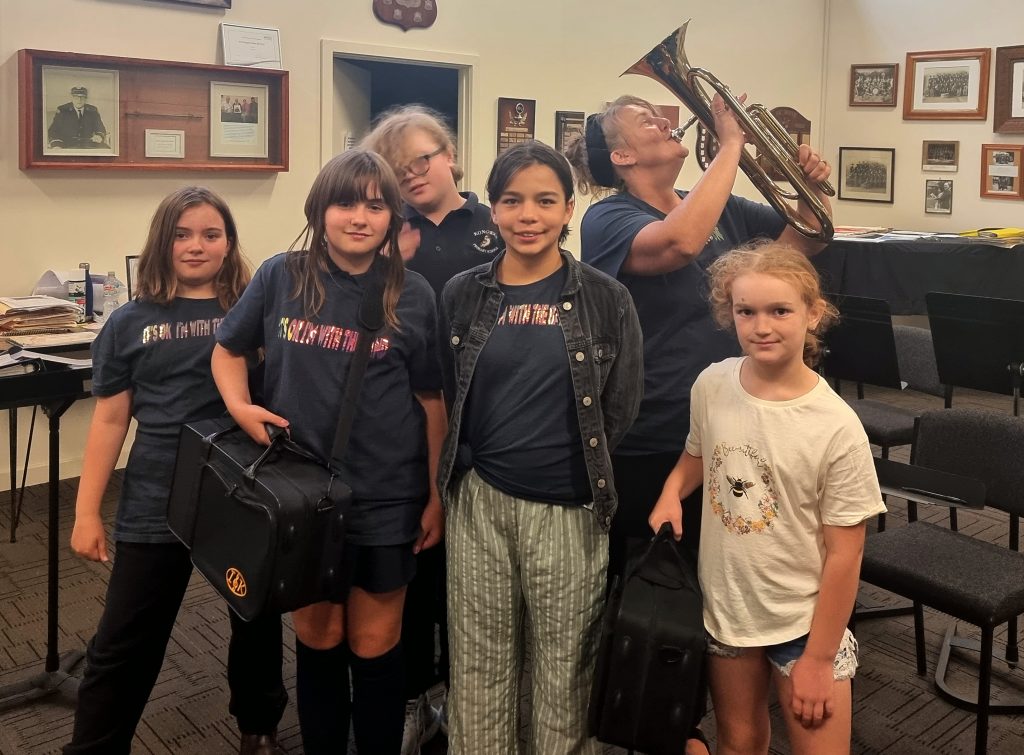
Established in 1910, Wonthaggi Citizens Band (WCB) is managed by a voluntary committee. Its vision is to develop and nurture musicians, enabling them to provide music for the benefit of the Bass Coast community.
With COVID having an impact in an already challenging socio-economic environment, the group wanted to give an affordable music education to young people. Their aim was to introduce them to the wonder and benefits of music and encourage their participation in the band by offering subsidised tuition on brass band instruments from a qualified music teacher. It also sought to strengthen connections by bringing participants together for rehearsals in a supportive environment.
There is much documentation on the educational, cognitive and physical benefits to be received from learning music on a brass instrument, particularly in improving numeracy and literacy skills. Research shows that children who take music lessons show different brain development and improved memory over the course of a year, compared to children who do not. Further, with the high focus on childhood obesity, participation in a marching brass band cannot be underestimated for improved physical health. It improves general fitness, flexibility and muscle strength through both breathing techniques and the physical activity of marching – giving an alternate physical activity to young people not interested in sport.
This project also responded to the Bass Coast Shire Youth Action Plan, which identified the lack of options for those not interested in sport and the lack of access to appropriate arts and culture.
The organisation successfully applied to FRRR, through the Gardiner Dairy Foundation Community Grants program for $5,000 to help them establish the program and cover the initial tuition fees subsidy.
As a result, 10 young people aged between 10 and 13 had their first introduction to brass band music. These participants received half-hour individual lessons in a variety of brass instruments and then came together to learn how to play together as a band. At the end of this period, eight young people remained engaged with Wonthaggi Citizens Band and have joined the Youth Band to further their music. These young people have formed a strong social connection with one another, which assisted them during the lockdown periods when they kept in touch online. Feedback from both young people and their parents have acknowledged the benefit young people received from their participation when many others were struggling in coping through the impacts of COVID.
This project has also created social connections between generations, as the three bands of Wonthaggi Citizens Band intermingle and participate in joint performances. The music learnings by the young people have been “outstanding”, as has their participation levels. This was in no small way due to the quality of the tutor and her ability to engage with the young people, and with the senior band members who volunteered their time to assist and mentor.
“We’re excited that this project is set to have a lasting legacy, with the band set to undertake a two-year project to work with 20 ‘at risk’ students at a local primary school, using brass band music to re-engage them,” said Sandra Mousey, a volunteer on the project.
“The community is more engaged and participative, students are more engaged in learning and there are generally stronger levels of resilience in the community,” she wrote.
For more inspiring stories like this, head to our FY 2021/22 Annual Review.
This case study is courtesy of the Gardiner Dairy Foundation
A new teen fitness program in Kyabram is inspiring community spirit and building fit and healthy bodies.
A health and wellbeing centre has been established by Kyabram Blue Light at the town’s P-12 College, thanks to $5,000 from the Gardiner Dairy Foundation Community Grants Program in partnership with Foundation for Rural & Regional Renewal (FRRR).
The centre has proven to be a holiday hit with local teenagers and will be used regularly during the school year.
It is part of the KyFit police and teen gym-based mentoring program and, according to organiser Senior Constable Mitchell Bull, the benefits are wide-ranging.
Teenagers have played a central role in establishing the gym in an old storeroom at the school.
“The kids have done the majority of it,” Senior Constable Bull said. “They put together a wish list of equipment, posters and information and then volunteered on weekends to load trailers and remove rubbish and then helped in designing the layout and setting up and testing the equipment.
“It’s not just given to them on a silver platter – it’s a community effort and we all chip in. For six or seven weekends in a row we had up to 10 kids at the gym helping out. We removed six trailer loads of rubbish from the storeroom.”
The gym includes two bench presses, two rowing machines, two magnetic resistance bikes, two treadmills, two decline sit-up benches, sets of dumbbells from 3kg to 10kg and 13 spin bikes for classes.
The Gardiner Foundation grant also helped with installing fans, electrical power points and tiles for the floor.
“We made every cent count and called in favours left, right and centre and had a lot of volunteer assistance with everything,” Senior Constable Bull said. “It’s nothing fancy but it’s equipment tailored to young people.”
The gym is the latest development in the KyFit program that started in 2019 and is run by Kyabram Blue Light using police members, volunteers and community members.
“It was identified there was a need for a sporting or physical program that didn’t require the time, cost and travel commitments of the likes of football or netball,” Senior Constable Bull said.
“The gym will help those who may not have the opportunity to be involved in the local gyms or sports clubs.”
Personal trainers, defence force members, police and other community members help with the program, ensuring young people can access a variety of training programs ranging from boxing to swimming sessions and pitting their abilities against the police fitness test challenge.
A weekly in-school program attracts at least 13 participants and after-school programs are reaching about 30 teenagers. The school also uses the facilities for physical education classes.
Senior Constable Bull said the grant had helped to empower local young people. “We used the gym over the school holidays, allowing kids to drop in when there wasn’t much else to do – we can barely keep up with the demand,” he said.
“A lot of kids want to join the program now because they’ve seen the benefits the others are getting. It’s helping with their physical and mental health and the kids are seeing the benefits of physical activity and working out with other people.”
Police can also use the fitness programs to help break down barriers between officers and young people.
“The kids get the benefits of getting to know local police and other volunteers and mentors,” Senior Constable Bull said. “It’s about building a relationship between police officers and young people and showing we’re approachable if there is a problem in the community that needs to be discussed.”
It’s also beneficial for police. “It means we’re not always seeing the negative side of things in the community and we get to work towards positivity,” Senior Constable Bull said.
The program is free for local teenagers who also receive a free sports top when they get involved.
In recognition of his work with young people, Senior Constable Bull was named Citizen of the Year for Campaspe Shire at the 2022 Australia Day Awards.
Now in its 20th year, the Gardiner Dairy Foundation Community Grants Program is delivered by the Foundation for Rural & Regional Renewal (FRRR). Grants of up to $5,000 help not-for-profit organisations in small Victorian dairy communities deliver projects that will benefit local people and strengthen their ability to deal with local issues and enhance existing community infrastructure.
Applications for the 2022 program opened on 1 March and close on 13 April. More information can be found at https://frrr.org.au/funding/place/gardiner-communities-grants/
$120,000 in Gardiner Community Grants available
The annual Gardiner Dairy Foundation Community Grants Program (Gardiner Community Grants) has opened today. Delivered in partnership with the Foundation for Rural & Regional Renewal (FRRR), this round marks the 20th year of the program, which is focused on supporting communities across Victoria’s three dairying regions.
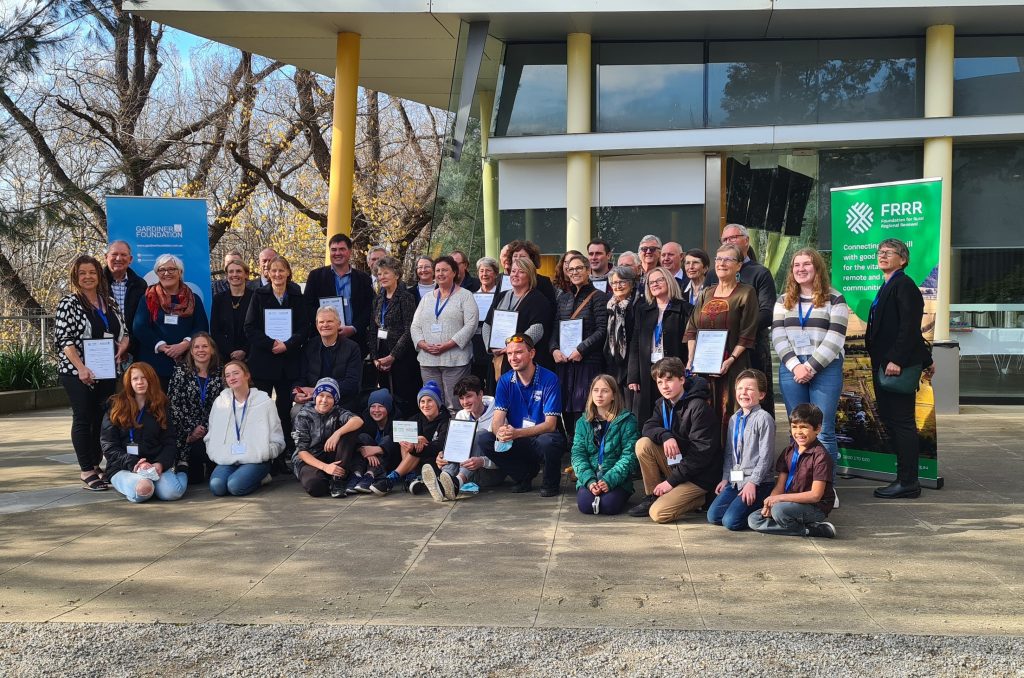
This year Gardiner Community Grants will encourage projects to focus on building the capacity of community organisations and improving digital connectivity. The new focus is in response to insights from FRRR’s Heartbeat of Rural Australia Report, which was published late last year.
The report highlighted that there was a significant digital divide in rural communities, compared to urban areas, and that local not-for-profit organisations needed capacity building support to be able to do their vital work, particularly following the impacts of back-to-back disasters, including COVID, on fundraising and volunteers.
A digital connectivity grant project might involve upgrading infrastructure and facilities, improving digital access or providing training that enables the community to benefit from digital services.
A building capacity grant aims to support organisations to sustain or grow the effectiveness of their operations. Funds may be requested for salaries to increase the organisations paid workforce, training for volunteers, upgrading office equipment or supporting strategic planning and improved governance.
The small grants program, which has $120,000 in available funds for grants up to $5,000, will continue to support a broad range of community projects that local groups identify can make their community socially, economically or environmentally stronger. Applications for events to enhance cultural vibrancy, volunteer planting projects to support environmental sustainability, extending education and training opportunities, support for infrastructure projects or programs to improve health and wellbeing are all encouraged.
Allan Cameron, Gardiner Dairy Foundation Chief Executive Officer, said Gardiner is committed to strengthening Victorian dairy communities and is pleased to be partnering with FRRR for the twentieth year to support innovative, community-driven projects.
“Investing in the communities that are at the heart of the Victorian dairy industry is critical to the sustainability of dairy farming in Victoria. Since launching the program with FRRR in 2002, Gardiner Dairy Foundation has supported over 500 local projects and distributed more than $2 million to Victorian dairy communities.
“Gardiner is committed to supporting the needs of the communities as they change and evolve, now, and in the future. That’s why, this year, we are encouraging initiatives around digital literacy and organisational capacity, to help local groups respond to the current needs of Victoria’s dairy communities,” Mr Cameron said.
Natalie Egleton, CEO of FRRR, said that the Heartbeat of Rural Australia Report called for more support to go to community groups to address critical issues, and it’s wonderful to see Gardiner Foundation respond.
“Our Heartbeat Report highlighted significant gaps and challenges for rural communities, but also highlighted the critical role that local not-for-profits play in meeting the needs and filling the gaps in rural communities. That’s why we value our longstanding relationship with Gardiner, because they, like us, are committed to working together to support these vital community groups in the long-term.
“For 20 years, Gardiner’s Community Grants have consistently boosted Victorian dairy communities with contributions towards large important community projects, and significantly enabling many smaller community organisations and projects, often for items and activities that are less accessible through government or major philanthropic funding,” Ms Egleton said.
Applications for the Gardiner Dairy Foundation Community Grants Program open Tuesday, 1 March and close Wednesday 13th April 2022 at 5 pm AEDT. More information can be found at – https://frrr.org.au/gardiner-communities-grants/.
Mental Health training helps community get in a good place
With the effects of plunging milk prices and bushfires in South West Victoria, the community was feeling strained. Front line workers were regularly being confronted with people breaking down because they couldn’t pay their bills, afford feed for their stock or feeling financial pressure.
The Simpson & District Community Centre (SDCC) knew it was important to keep the conversation about mental health in the community open, to continue to break down the stigma associated with asking for help. So, they wanted to equip local community members with the skills to recognise mental health issues and provide resources for referrals to support services, as well as give them skills in self-care, given they were dealing with more and more people in crisis.
SDCC was established almost four decades ago to support Western Victorian dairying communities. Around 50 people a week use its facilities for meetings and activities – from craft, scrabble days, children’s activities, adult education, digital literacy, a Men’s Shed programme and more. The centre puts considerable effort into reducing social isolation and increasing health and wellbeing in the area.
The Simpson area has been supported by a Dairy Community Support Officer who works with farming community families in crisis. In three years, the social worker’s client numbers went from 9 to 98. She identified a number of mental health issues facing the community including anxiety, depression, drug and alcohol abuse and self-imposed isolation. The community has had one suicide since the beginning of the dairy crisis and wanted to do whatever was needed to prevent more.
Through the In a Good Place Program, funded by CCI Giving, FRRR was able to help fund the delivery the training. In March 2019, nine community members participated in a two-day Mental Health First Aid course. Another session ran in March 2020, with a half day refresher for the previous years’ participants.
In total, 16 members of the community were provided with the training and skills to identify and start a conversation regarding mental health. Those trained included workers from the local supermarket and Post Office, stockfeed supplier and vet group, as well as dairy farmers and volunteers from the Football Netball Club, Men’s Shed, Community Centre, Cricket Club, CFA and Landcare network. The array of participants meant that there was great community coverage, with everyone attending wearing “more than one hat” – so those new skills are going into nearly every organisation and workplace in Simpson.
Furthermore, the instructor for the First Aid program and the Dairy Community Support Officer were able to identify an opportunity to secure funding for additional training that will reach the community, regarding Mental Health in the elderly population. Transitioning off farms for older people is an area of mental health difficulty that the Support Officer sees first hand in her work in the community.
The SDCC maintains that if just one person can be supported through a crisis without a tragedy, then the program will be a success.
“Training more people in the community to recognise the signs and direct them to help or help to them can only improve the long term outcomes for our community and increase the resilience and sense of connection.
“By providing the training we are giving people the skills to take back into the community at their workplaces, homes and recreation activities. The more people who are able to recognise and respond to the signs of deteriorating mental health the stronger our community will be. These skills will be maintained for life and can be shared.”
SDCC Final Report
Congratulations to the SDCC for the great strength and support they provide and their ability to adapt to the community’s changing needs.
